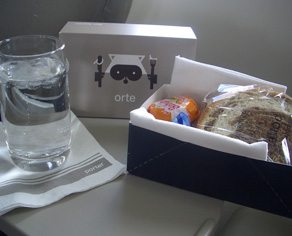Dear Urban Diplomat: Can Porter Airlines really demand that I pay for food with my credit card instead of cash?

I was flying to Montreal on Porter Airlines recently, and when I went to the terminal snack bar to grab a chicken wrap for my pregnant wife, the cashier rejected my $10 bill. “Oh, sorry,” she said. “We don’t take cash.” I half-expected Ashton Kutcher to jump out from behind the almonds dispenser. Cash, the transactional medium that predates Jesus Christ by 700 years, not welcome? I threw a mini-fit, during which I might have taken J. C.’s name in vain, which in retrospect wasn’t so dignified. But seriously, can they do that?
—Flying off the Handle, Upper Beach
There’s no law that governs how a merchant can ask to be paid. Porter could, if they wanted, demand payment in bottle caps, Pogs or petition signatures supporting C-Series jets. Your recourse would be to switch to another airline, where, no doubt, you’ll be equally outraged by the price of a thimble-size glass of chardonnay or some other egregious gouge. A better way to handle the situation? Silently, and with a grudging acceptance of our digital future.
Send your questions to the Urban Diplomat at urbandiplomat@torontolife.com






At one time, I did not use my credit card for purchases under $10. Today, adjusting for inflation, I set my own limit at $20.
Something needs to be done about this.
A lot of airlines do this. On my last trip on one of the majors my card was in my carry on somewhere above…the attendant gave me my purchase free
Porter does not own that food bar. Though it is in their lounge it is run by another company.
You want cheap airfares? Get used to every possible surcharge and any other way to scrimp. Airlines don’t want to pay their staff to count cash or have to make floats.
I had brunch at a place where it was cash only. If one can be cash only, why not credit/debit only?
That was nice of them…oh and thank you for calling us Attendants…that is also nice…
I agree
The answer is found in a federal statute, namely the Currency Act, R.S.C. 1985, c. C-52, s. 8(1)(b). A ten-dollar bill is legal tender because it is a note “issued by the Bank of Canada…intended for circulation in Canada”. Merchants are legally required to accept undamaged Canadian paper money, but may decline coins exceeding the totals set out in subsection 8(2).
Porter does own the lounge. The policy is sensible and they also accept debit. There is one cashier serving the entire lounge of waiting flights, if they had to make change for every single person it would be a nightmare.
They may not have the mean to process cash transactions. The company’s finance/accounting department may not have a bank account to which cash deposits can be made.
Read the Currency Act.
A nightmare? Aren’t you the drama queen!
If they can’t handle cash transactions, stop the business. It’s the easiest of all methods of payment. Or are you implying that staff can’t make change?
How does one get the Currency Act enforced?
That section doesn’t say businesses have to accept paper money or coins. It is saying that offering to pay with money issued by the Bank of Canada is a legal way of paying for a transaction. “A tender of payment in money is a legal tender if it is made… in notes issued by the Bank of Canada…” Tender = offer. Doesn’t say your offer has to be accepted. The Act goes on to say (s.13) that all transactions will be carried out in the currency of Canada or in the currency of another country or in a “unit of account” the value of which is determined with reference to the currencies of one or more of Canada and other countries. But again, it never says that businesses have to accept payments of any currency or unit of account in specific forms. (Although this section seems to contradict the response in the article that a business could transact business with payment in bottle caps etc.)
I think there might be other statutes that say that you have to accept cash in satisfaction of a debt, but I’m not sure – and it’s irrelevant because this isn’t a debt. Maybe you could make the argument that a restaurant that only bills you at the end of the meal has to accept cash, but in this case, the obligation to pay arises at the same time as the offer to pay, so there’s no debt.
also, Porter gives free food and drinks during meal times and good snacks on the plane